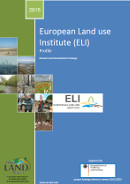Information & Publications
The ecosystem services concept – a new Esperanto to facilitate participatory planning processes?
We have recently submitted an article titled "The ecosystem services concept – a new Esperanto to facilitate participatory planning processes?" to Landscape Ecology journal. This study explores the potential of the ES concept to serve as such a boundary object ("new Esperanto") to facilitate the integration of different actor perceptions and objectives into coupled planning goals. We analyzed eleven case studies in order to explore how the ES concept has been operationalized in supporting participatory planning processes and to identify guidance from successful applications. We identified several positive effects of applying the ES concept in the case studies, including the facilitation of knowledge sharing and consideration of local experiences, the support for creating a shared vision, and the raised awareness among local actors concerning their roles as ES suppliers or beneficiaries. One of the main risks identified concerning the use of the ES concept in participatory planning was the overemphasis of specific goods or services.List of authors:
Marcin Spyra1,2, Janina Kleemann1,12, Nuket Ipek Cetin3,4, Vázquez Navarrete Cesar Jesús5, Christian Albert6, Igone Palacios-Agundez7,8, Ibone Ametzaga-Arregi7,9, Daniele La Rosa10, Daniel Rozas11,12, Blal Adem Esmail13, Paolo Picchi13, Davide Geneletti13, Hannes J. König14, HongMi Koo1,12, Leena Kopperoinen15 and Christine Fürst1
1 Martin-Luther University Halle-Wittenberg, Institute for Geosciences and Geography, Department Sustainable Landscape Development, Von-Seckendorff-Platz 4, 06120 Halle, Germany
2 Opole University of Technology, Faculty of Civil Engeneering and Architecture, Katowicka 48, Opole, Poland
3 Gebze Technical University, Faculty of Architecture, Urban and Regional Planning Department, 41400, Kocaeli, Turkey
4 Istanbul Technical University, Graduate School of Science, Engineering and Technology, 34467, Istanbul, Turkey
5 Colegio de Postgraduados, Campus Tabasco, Periferico Carlos A. Molina s/n, 86500, Cardenas, Tabasco, Mexico
6 Leibniz University Hannover, Institute of Environmental Planning, Herrenhäuser Str. 2, 30419 Hannover, Germany
7 UNESCO Chair on Sustainable Development and Environmental Education, University of the Basque Country—UPV/EHU, Barrio Sarriena s/n, Leioa 48940, Spain
8 Mathematics and Experimental Sciences Didactics Department, University of the Basque Country—UPV/EHU, Paseo de la Universidad 7, 01006, Spain
9 Plant Biology and Ecology Department, University of the Basque Country–UPV/EHU, Barrio Sarriena s/n, Leioa 48940, Spain
10 Department Civil Engineering and Architecture University of Catania, Via S. Sofia 64 – 95123 Catania, Italy
11 Universidad Católica de Temuco, Department of Environmental Sciences, Spatial Planning Laboratory, Rudecindo Ortega 02950, Temuco, Chile
12 Center for Development Research, Department of Ecology and Natural Resources Management, University of Bonn, Walter Flex Str. 3, 53113 Bonn, Germany
13 University of Trento, Department of Civil, Environmental and Mechanical Engineering, Via Mesiano 77, 38123 Trento, Italy
14 Leibniz Centre for Agricultural Landscape Research (ZALF), Research Area Biotic Interactions between Forest and Agricultural Land, Eberswalder Str. 84, 15374 Müncheberg, Germany
15 Land Use and Urbanisation Unit, Biodiversity Centre, Finnish Environment Institute SYKE, Helsinki, Finland
International Association for Landscape Ecology (IALE) working group "Urban and peri-urban governance"
The objectives of the "Urban and peri-urban governance" IALE working group is to work with environmental governance issues related to urban and peri-urban contexts.Our understanding of environmental governance shifts from "the act or process of governing" (Longman dictionary of English) into wider understanding. Many of actions implemented in the frame of environmental governance are based on participatory processes, including stakeholders, citizens, scientists and of course planners. The notion of environmental governance includes very practical processes. Environmental governance is implemented through formal actions, framed by local legislations, together with many more flexible bottom-up initiatives implemented by local citizens.
The vulnerability of urban and peri-urban areas, the dynamic processes of urbanization and sub-urbanization, increasing urban populations, and other processes ask for ecological wisdom in environmental governance. Urban systems become cross-boundary phenomenon, which challenges even more the environmental governance in such contexts. This addresses urban, regional and (cross-) national development goals such as air pollution reduction, integrated watershed-management, transport-management, economy and employment, the provision and accessibility to ecosystem services.
This Working Group provides a forum for two general types of actions:
- Theoretical, based on building knowledge concerning to the issues of environmental governance in the urban and peri-urban contexts
- Practical, oriented into actions implementing the theory like working with urban and peri-urban case studies or workshops with stakeholders and students
Coordinator / contact person: Dr. Marcin Spyra, marcin.spyra[at]geo.uni-halle.de
More information: http://www.landscape-ecology.org/working-groups/urban-and-peri-urban-governance.html









